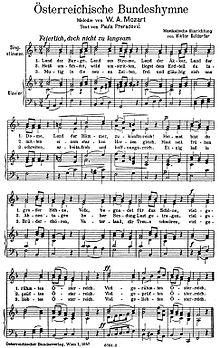National anthem of Austria
show This article may be expanded with text translated from the corresponding article in German. (June 2019) Click [show] for important translation instructions. |
| English: National Anthem of the Republic of Austria | |
|---|---|
 Sheet music of the Austrian national anthem from the late 1940s, citing Wolfgang Amadeus Mozart as the composer and utilizing the pre-2011 lyrics. | |
National anthem of | |
| Also known as | Land der Berge, Land am Strome (English: Land of the mountains, land by the river) |
| Lyrics | Paula von Preradović, 1947 (modified in 2012) |
| Music | Disputed (possibly ), 1791 |
| Adopted | 1946 (as instrumental) 1947 (with lyrics) |
| Preceded by | "Sei gesegnet ohne Ende" (as independent Austria) "Deutschlandlied" and "Horst-Wessel-Lied" (as part of Germany) |
| Audio sample | |
"Bundeshymne der Republik Österreich" (instrumental, one verse)
| |
The national anthem of Austria, also known by its incipit "Land der Berge, Land am Strome" (German pronunciation: [lant deːɐ̯ ˈbɛʁɡə lant ʔam ˈʃtʁoːmə]; Land of mountains, land by the river), was adopted in 1946. The melody, attributed to various composers (most probably by ), was matched with a text by Paula von Preradović the following year.
History[]
Nineteen days before his death on 5 December 1791, Wolfgang Amadeus Mozart composed his last complete work, the Freimaurerkantate, K. 623. In parts of the printed edition of this cantata there appeared the song K. 623a "Lasst uns mit geschlungnen Händen" ("Let us with joined hands"). To this melody the Austrian national anthem is sung. Today, Mozart's authorship is regarded as dubious and the song is attributed to (either solely or co-authored with Mozart)[1] or Paul Wranitzky.[2]
Before the World War II Anschluss, Austria's state anthem was "Sei gesegnet ohne Ende", set to the tune of Haydn's "Gott erhalte Franz den Kaiser", the state anthem of imperial Austria since 1797. The current German national anthem "Deutschlandlied" uses the same tune, but with different words (it was also the co-national anthem of Germany during National Socialist rule). To avoid the association, and because singing it was banned for a time after the war, a new state anthem was created. The lyrics were written by Paula von Preradović, one of the few women to have written lyrics for a national anthem.[3] On 22 October 1946, the song was officially declared Austria's national anthem, albeit without words. Lyrics were added in February 1947. On 1 January 2012, parts of the lyrics were changed to make the composition gender-neutral.
Attempts at gender-neutral language[]
Since the 1990s, several attempts have been made to modify the lyrics to use more gender-neutral language. In 2005, Women's Minister Maria Rauch-Kallat of the Austrian People's Party (ÖVP) stated her objection to the words sons, fraternal and fatherland in the lyrics and proposed changes.[4] Her proposal met strong resistance by Austria's largest newspaper, the Kronen Zeitung, and failed to gain support from the then coalition partner, the Alliance for the Future of Austria (BZÖ).
In January 2010 Austrian pop singer Christina Stürmer presented a pop version of the hymn "Heimat bist du großer Söhne und Töchter" ("Thou art home to great sons and daughters")[5] as part of a campaign by the Austrian federal ministry of education. She was sued for violation of copyright by the estate of Paula von Preradović but subsequently cleared by the Austrian Supreme Court of Justice[6] who called it "a mere modernisation" and allowed the version to stand.
Since 1 January 2012 a few words in the state anthem are different from before. The text and notes of the state anthem were officially codified in the "Bundesgesetz über die Bundeshymne der Republik Österreich" (English: Federal act about the federal anthem of the Republic of Austria).[7]
Lyrics[]
| German original | Poetic English lyrics |
|---|---|
Land der Berge, Land am Strome, |